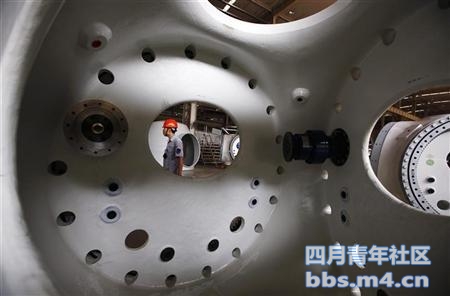|
|
本帖最后由 lilyma06 于 2011-12-1 09:08 编辑
【中文标题】十年之后,中国WTO之路将遭遇崎岖波折
【原文标题】
Analysis: After 10 years, China's WTO ride could get bumpier
【登载媒体】路透
【来源地址】http://www.reuters.com/article/2011/11/29/us-china-wto-anniversary-idUSTRE7AS0BM20111129
【译者】我思我走
【翻译方式】人工
【原文库链接】http://bbs.m4.cn/forum.php?mod=viewthread&tid=3245187&fromuid=227441
【声明】欢迎转载,请务必注明译者和出处 bbs.m4.cn。
【译文】

(Reuters) - Rising trade protectionism and frustration over its domestic subsidies spell trouble for China and could lead to more friction within the World Trade Organization than Beijing has grown accustomed to over the past decade.
On the eve of China accession to the WTO 10 years ago this December, naysayers warned that the country could falter under the demands of opening up its economy. Now there is little debate that it has been a boon in making China the world's largest exporter and the second largest trading nation.
(路透)日益增长的保护主义和国内补贴的失败困扰着中国,并且可能导致中国在世贸组织遭遇更大阻力。比之过去十年已经适应的情况还要严峻。
在中国加入世贸组织的前夜,怀疑者警告中国可能会动摇开放本国经济的要求。而现在关于中国作为最大的出口国和第二大贸易大国是受益国的争论已经很少了。
But China's next decade in the trade group could be tougher. That's partly because while the country has opened many of its markets as required under the WTO rules, it still heavily subsidizes key industries.
State spending on clean technologies, which has already drawn ire from China's trading partners, could continue rising after last week's confirmation by Beijing of a massive investment plan for "strategic industries."
但是中国在贸易组织的未来十年将变得艰难。部分原因是因为尽管这个国家已经按照世贸组织规则开放了许多市场,但是在关键产业仍然不放弃高额补贴。
国家花费大量的前在清洁技术领域,已经让中国的贸易伙伴大为不满,在北京确认仍然会对“战略产业”巨额投资后,不满情绪进一步升温。
That can only lead to increased friction as the global economy slows and countries scramble to boost exports.
"Some aspects of China's economic system are fundamentally inconsistent with the market economy-based
principles of the WTO," said Wang Jiangyu, a law professor and WTO expert at the National University of Singapore. "In the first few years, they (WTO members) could tolerate this, but as China's trade grows you will see more and more cases against China."
这样的做法只会导致在全球经济增长变缓情况下增大摩擦,和激发国家间恶性出口竞争。
“中国经济体制的一些方面与世贸组织市场原则的经济制度是不一致的,”新加坡国立大学的法学和WTO专家王江与说。“早期,世贸组织成员可以宽容,但伴随中国贸易额的增长,你可以看到反对的声音越来越多”。
Experts say a recent WTO ruling that cheap state-supported financing and land give an unfair advantage may lead countries to increasingly resort to anti-subsidy cases against China -- a trade weapon that aims at the heart of China's state-backed economic model.
专家表示,世贸组织近期针对国家财政和土地支持造成不公平的优势的裁决,可能导致许多国家增加对中国进行反补贴起诉,并当做贸易武器攻击中国的国有经济体制。
FIRING AT THE CHINESE "MOTHERSHIP"
To date, WTO members have used anti-dumping cases to target China's trade policies.
That's relatively easy to do, since China is still considered a "non-market" economy under the terms it negotiated in 2001. To build a case, another country can substitute China's prices with those of another, often pricier market economy.
剑指中国“巨无霸”
迄今,世贸组织成员国已经运用反倾销手段攻击中国的贸易政策。
这样做非常容易,因为中国自2001年谈判加入世贸就被视为一个“非市场国家”。一旦开始起诉,原告国可以用一个市场国家的高价替代中国的产品价格。
That clause -- which Beijing sees as unfair -- expires in 2016.
But a recent WTO decision said state involvement must be accounted for in bank financing, land prices and production input prices.
That means the possible use of a similar tactic in anti-subsidy cases: using higher third country market rates and prices to show subsidized pricing.
这样的条款被中国视为在2016年约满之前是不公平的。
但是最近世贸组织的一项决议认为一国产品价格应该包括银行融资、土地价格和生产资料价格。
这就意味着在反补贴案件里使用类似诉讼技巧的可能性:用第三国更高的市场价格和利率去衡量补贴价格。
In essence, China must still answer for its non-market economy subsidies past 2016.
Chin Leng Lim, a law professor at the University of Hong Kong, said challenging China on cheap land and financing -- when the government owns all the land and banks -- is more intrusive than going after unfairly underpriced goods. It is firing at the "Chinese mothership."
实际上,中国必须在2016年后回应自己的非市场经济补贴问题。
香港大学法律教授陈灵力(音译)说挑战聚焦在中国廉价土地政策和财政政策——当政府控制了所有的土地和银行——这比不公平的低价商品还要糟糕。开火的目标是中国巨无霸系统。(mothership是个比喻,不知道怎么翻合适)
"It's about saying to China: we don't like the way you regulate and control your banks. We don't like the way you regulate land. We don't like the support you give to your state-owned enterprises. So change all of that," Lim said.
Anti-subsidy retaliation is already happening, and green technology is a likely battlefield.
“这就好比告诉中国:我们不喜欢你监管和控制银行的方式。我不喜欢你控制土地的方式。我们不喜欢你支持自己的国有企业。所以,改变这些吧。”陈说。
反补贴报复已经开始,绿色能源产业可能就是下一个战场。
In early November, the U.S. government launched an investigation into imports of Chinese made solar panels after U.S. solar companies called for anti-dumping and anti-subsidy duties. In return, China's commerce ministry said on Friday it was looking into U.S. renewable energy subsidies.
"That's what a trade war looks like, when it is tit-for-tat," Lim said. "And it is all happening in and around anti-subsidy law."
在11月份早些时候,美国政府在美国太阳能企业申请反倾销反补贴诉讼后开始了对中国太阳能电池板制造企业的调查。作为报复,中国商务部在周五宣布,将密切监视美国在可再生能源方面的补贴。
CHANGING GOALS
The man who negotiated China's entrance into the WTO is worried about his country's pledges to liberalize the economy.
"Essentially, after 10 years, it seems China is getting farther from the WTO," Long Yongtu said at a conference on the WTO anniversary in October.
改变目标
中国入市谈判主导人现在担忧自己的国家是否能够完成自由化的承诺。
“实质上,在十年之后,中国似乎与WTO的距离越来越远”,龙永图在十月份WTO周年纪念会上这样说到。
WTO clashes are bound to rise, say trade experts, not only because trade rules are being used differently, but also because -- as the shift away from the WTO shows -- China's goals have changed.
Scott Kennedy, director of Indiana University's Research Center for Chinese Politics and Business, said now the priority of China's leaders is not liberalizing the market but boosting competitiveness by moving up the industrial value chain.
在WTO的争端一定会增多,贸易专家如是说。不仅是因为贸易规则的变化,还和——重心从WTO转移显示 ——中国的目标已经改变。
印第安纳大学中国政治与商务研究中心主任斯科特•肯尼迪说现在中国领导人优先考虑的不是使市场自由化,而是通过提到产业链位置来增强竞争力。
"That is a different mission than what Long Yongtu and his team were pushing for when they were pushing for liberalization to improve the Chinese economy," Kennedy told Reuters in Beijing, where he is also visiting professor at the University of International Business and Economics.
“这个任务是龙永图和他的团队过去努力推动中国经济自由化来提振中国经济的道路是不同的”,肯尼迪在北
京如此告诉路透社。他也是北京的对外经济贸易大学的访问教授。
During trade talks in Chengdu, China confirmed to U.S. officials that Beijing plans to pour $1.7 trillion into a number of strategic sectors over the coming five years.
While officials promised foreign firms would not be overlooked in the massive spending spree, foreign governments may see much of the investment as unfair subsidies for home-grown champions -- many in cleaner and hi-tech sectors.
在成都的贸易谈判中,中国向美国官员确认了北京在未来五年将会投资1.7万亿美元到战略部门。
当官员承诺外国公司不会在这场投资盛宴中被忽视,外国政府还是可能将投资视为对国内选手的不公平补贴,许多将投放在清洁和高技术领域。
After a decade, the debate has come full-circle, and more of China's exasperated trade partners are likely to head to the WTO dispute resolution system looking for answers.
十年之后,争论毫无进展,中国许多怒气冲冲的贸易伙伴将跑到世贸组织的争端解决制度寻求答案。
Lim, the University of Hong Kong law professor, said it is much like the debate before 2001, when they were deciding whether to allow a country that is not a free-market economy into the WTO.
"The counter argument to that was, how can you call it a world trade organization if China is not in it? So do we need to change China's rules, or do we need to change global rules to accommodate China?" he said.
香港大学法律教授陈灵力说这特别像2001年之前的辩论,当时正在讨论是否允许一个非自由市场国家进入世贸组织。
“当时的针对性言论是,如果中国不加入又何谈世界贸易组织呢?我们是应该改变中国的规则,还是应当改变世界规则去适应中国呢?”他说。
|
|
评分
-
2
查看全部评分
-
|